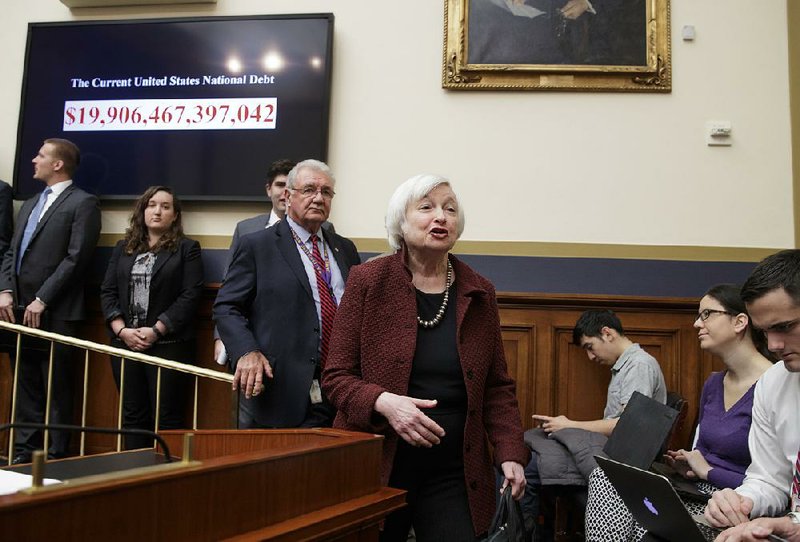WASHINGTON -- Federal Reserve Chairman Janet Yellen on Wednesday resisted calls from House Republicans to halt discussions with global financial regulators until President Donald Trump can fill vacancies on the central bank's Board of Governors.
"These are all ongoing discussions in which U.S. regulators participate," Yellen told the House Financial Services Committee. "Nothing is effective in the United States unless we go through a rule-making process here."
Rep. Patrick McHenry, R-N.C., wrote to Yellen last month telling her that "the Federal Reserve must cease all attempts to negotiate binding standards burdening American businesses until President Trump has had an opportunity to nominate and appoint officials that prioritize America's best interests."
There are two vacancies on the seven-member board at the Fed, which is an independent federal agency.
A third seat will soon become vacant: Fed Gov. Daniel Tarullo submitted his resignation Friday, effective around April 5. Among the openings is the position of vice chairman for supervision, who oversees regulatory matters.
The number of vacancies is historically large for the Fed, in part because Senate Republicans blocked Obama nominees to fill open seats in recent years. It's not known when Trump will make nominations, and eventual nominees would take weeks if not months to be confirmed by the Senate.
Yellen wrote back to McHenry last week, saying the Fed can influence the development of international regulatory standards "in ways that promote the financial stability of the United States and the competitiveness of U.S. firms."
The Fed would continue its global discussions, she said, reiterating to McHenry that U.S. regulators must separately adopt any rules related to international standards, she said.
"In exercising our longstanding authorities and responsibilities for consulting with our foreign counterparts, we share the objective that the whole U.S. government must work constructively to ensure a strong, stable U.S. economy and financial system," Yellen wrote.
McHenry and other Republicans on the Financial Services Committee kept up the pressure on Yellen when she testified before the panel Wednesday.
Rep. Andy Barr, R-Ky., went beyond international discussion, telling Yellen that the Fed should not make any regulatory changes until Trump can fill the vacancies.
"Many financial institutions in my district and around the country are concerned that the Fed may cram through a new wave of regulations before these new governors are confirmed," he said.
Saying that the 2010 Dodd-Frank financial overhaul law produced "an avalanche of red tape," Barr told Yellen that "it's imperative that the Federal Reserve refrain from issuing any new regulations until the new governors are confirmed."
Rep. Jeb Hensarling, R-Texas, the committee chairman, asked Yellen if the Trump administration had authorized the Fed to participate in discussions on regulation of asset management with the Financial Stability Board.
The international organization, which monitors and makes recommendations about the global financial system, includes the Fed, the Treasury Department and the Securities and Exchange Commission.
Yellen responded: "We participate regularly as part of our established responsibilities."
McHenry pushed her again for a halt on global regulatory talks, saying the Trump administration "has a markedly different approach" to financial regulatory standards.
McHenry asked Yellen if she would wait to see if the Trump administration had any opinion on one set of ongoing international discussions by the Basel Committee on Banking Supervision regarding capital reserves that banks must hold.
She emphasized that U.S. regulators are not bound by international discussions and in some cases have disagreed with standards set in global talks.
"I'll summarize that as ... you'll probably not wait for the new administration to put regulators in place," McHenry said.
Business on 02/16/2017

